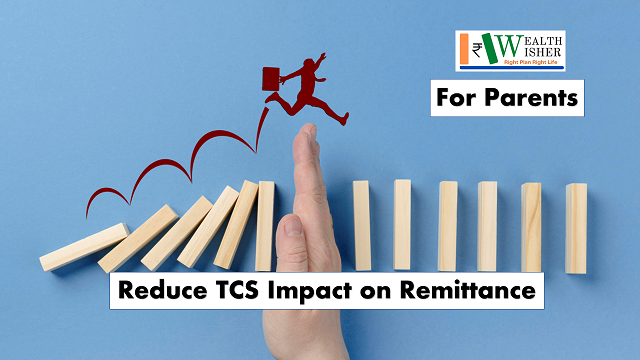We all know, that starting October 1, 2023, the new TCS (Tax Collected at Source) has increased for remitting money abroad from India under the Liberalized Remittance Scheme (LRS). These will increase the burden of TCS on Foreign Remittance on Education. Is there a way out to minimize this tax burden by proper planning or strategizing the payment? Let’s learn this.
The new tax rates will mostly impact:
- Parents of students studying abroad.
- Indians planning to travel abroad. (Covered here in this article)
In this article, we shall cover the first topic which is – Minimizing the Impact of New TCS on Foreign Remittance on Education for Students.
RBI Circular on Foreign Remittance
The new TCS rate on remittance wef Oct 1, 2023 – what has changed?

The TCS of a maximum of 20% will apply on any payment made using forex cards, wire transfers, or foreign currency purchases above Rs 7 Lakhs. This excludes the payments made for educational & medical purposes.
We have written a detailed article on increased TCS – Here
Before Oct 2023, there was no TCS below Rs 7 Lakhs. Here is the image of new rates & changes made.

How the Education Sector will be impacted?
For a student who has financed his fees through a loan, the TCS is zero up to Rs 7 Lakhs & 0.5% over this threshold of Rs 7 lakh will be applicable.
In case the fees are not financed and paid by self or parents, the TCS till Rs 7 Lakh will be zero. Above that a rate of 5% will apply. (This is also applicable for payments made for medical purposes)
The limit is calculated on a gross basis per financial year. This means Rs 7 lakh can be remitted in one go or batches in the FY.
How to save the TCS on Foreign Remittance on Education?
The education financed by a loan is more beneficial. Hence first of all it is better to get a loan for education. It is also clarified that a loan has to be financed through a Regulated Finance Institution (RBI). Loans taken from parents of family/friends will not qualify for this.
So one can do the following to minimize the impact of TCS on Foreign Remittance on Education :
- Avail loan from a finance institution.
- File the accurate purpose code of remittance in form A2 plus LRS declaration.
- Parents must use their overseas investments to fund their kid’s education abroad. In case your kid is planning to get an education abroad, you must plan some investments outside the country.
- Investments made in foreign currency save forex conversion charges.
- The remittance can be divided between family members. LRS limit applies to every individual on an FY basis. So to finance say 12 Lakhs both mother & father can remit Rs 6 Lakh each to not breach the threshold of Rs 7 Lakh.
- Even if say one parent does not have earnings of his own, the other one can donate as no tax will be applied as doner-donee are covered under relative under the Income Tax Act.
- Remitters can also divide the payment wisely between dates of the financial year. Eg to send Rs 10 Lakh one can send Rs 5 Lakh before 31 March and the next 5 Lakh in April as the FY gets changed.
- Using the TDS to get benefits by adjusting it by other incomes (mentioned below).
How to adjust or utilize the TDS/TCS
The TCS or Tax Collected from the Source helps by not imposing the extra burden of tax at one go. But sometimes it can be beneficial to use the deductions for other incomes. Some of these can be:
- TCS can be used to offset the tax liability when you file your returns.
- If a person does not have tax liability he may apply for a refund of the TCS.
- If you have business income the TCS can be used as Advance Tax Payment.
- Salaried employees can request their HR or payrolls to use the TCS under the monthly tax deduction. This will increase the tax in-hand salary.
Hence – as it is said Taxes & death are sure to happen. But one can develop healthy habits to stay away or lessen the impact of taxes. Remittance is getting very popular as Indians are thriving and interacting more via education, tourism, business, or work. Hence remittance will play a very big role.
Hope this article will help parents reduce TCS on Foreign Remittance on Education.








